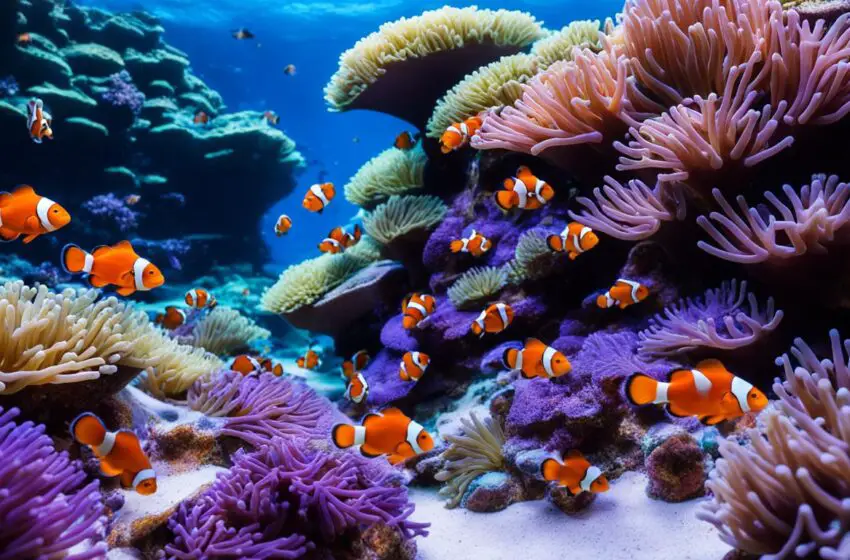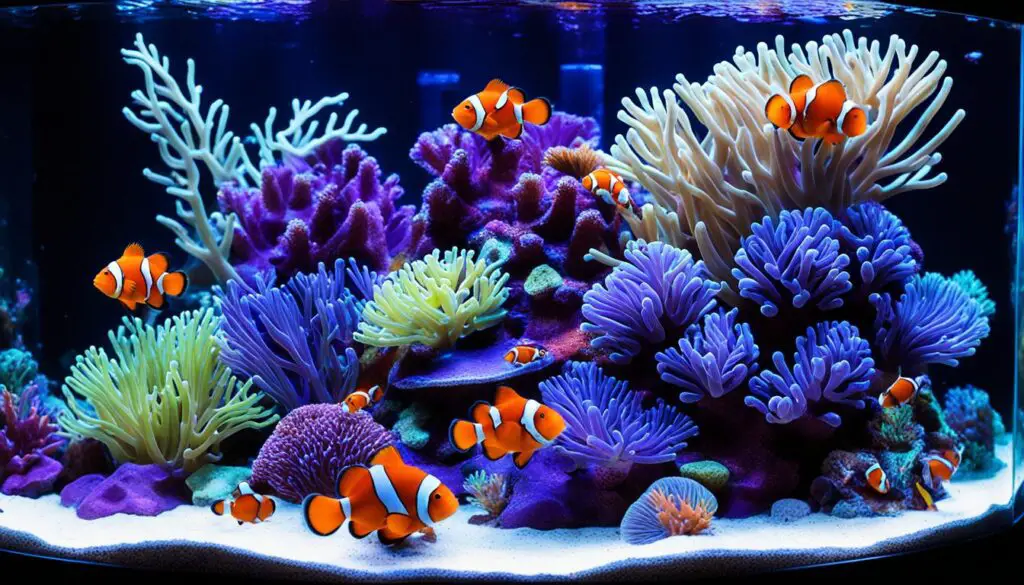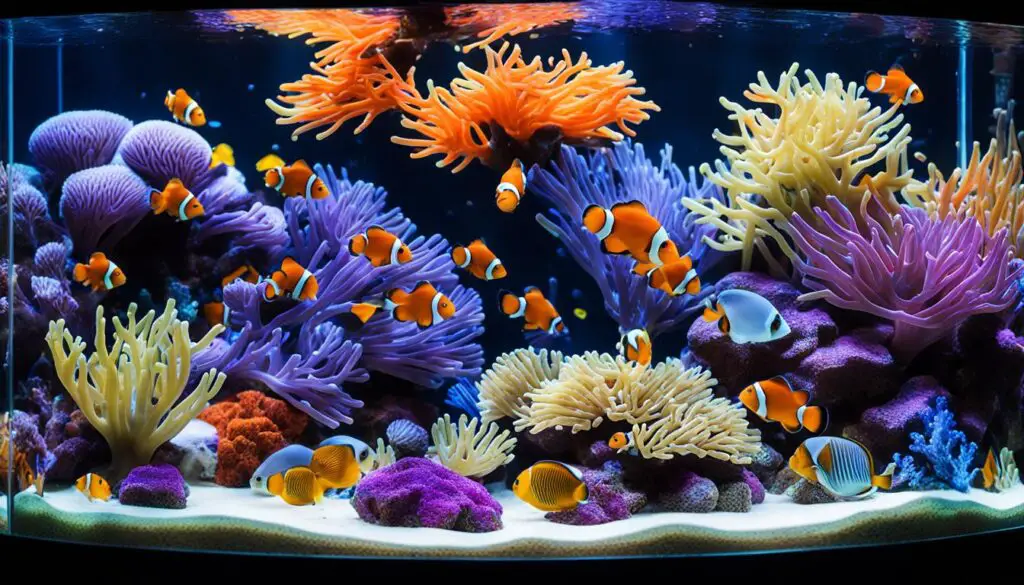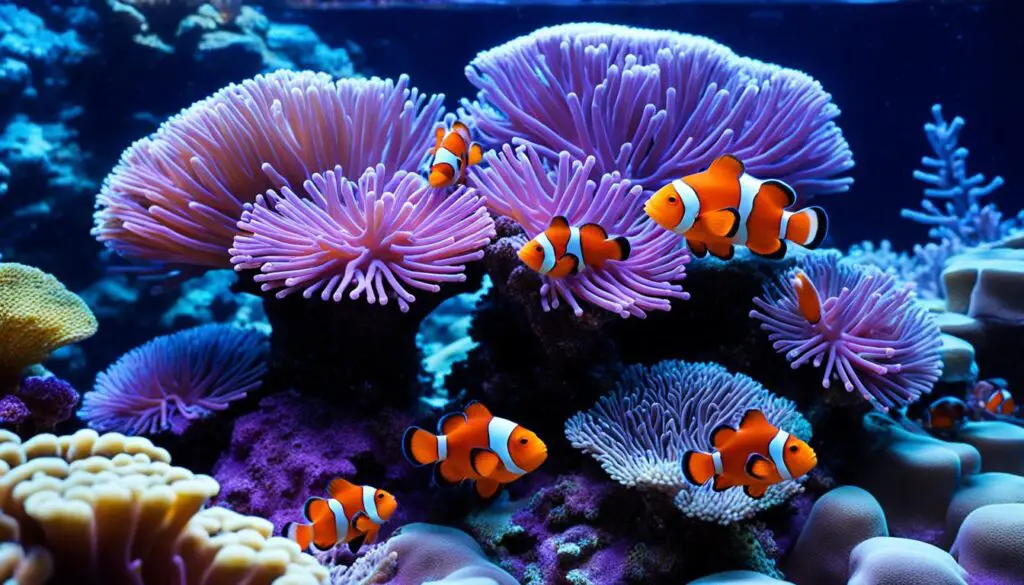Conservation in Clownfish Tank Management: Tips for Success

Welcome to the world of clownfish tank management! As a caring aquarist, it’s key to think about your tank’s impact on the planet. You can make a difference by using simple strategies. This way, you’ll keep your clownfish healthy and help marine life.
Let’s look at some tips for a successful tank. We’ll also see how to reduce any harm to the environment.
Key Takeaways:
- Purchasing an RO/DI filter helps reduce the environmental impact by providing clean water and promoting animal welfare.
- A hands-on approach and learning through experience are crucial in successfully managing a clownfish tank.
- Regular water testing, especially for alkalinity, nitrate, and phosphate, is essential for maintaining a healthy tank.
- Using a PAR meter or following established lighting guidelines ensures the right amount of light without harming the coral or fish.
- Having a clear end goal in mind helps design and build a tank that meets your desired outcome.
Characteristics Of A Beginner Fish
Starting a saltwater fish tank means picking the right beginner saltwater fish. They should be hardy and adaptable. These traits are key for those new to fishkeeping.
- Hardiness: Beginner fish handle changing water conditions well. This quality is great for those just starting out.
- Adaptability: A beginner fish should adjust easily to different water conditions. This makes the tank environment more stable.
- Handling Shipping and Acclimatization: Not all fish travel and adapt the same way. It’s wise to choose fish that endure these processes with less stress. This boosts their survival chances in a new home.
Affordability and easy availability matter a lot. Inexpensive fish can help you save money, especially if some don’t make it. For those without local fish stores nearby, choosing commonly available fish is smart.
Fish that acclimate easily to new environments are less stressed. Choosing species that ship well lowers the risk of loss during transit.
Choosing captive-bred fish is good for the environment. These fish are healthier and protect wild fish populations.
Considering the tank size is essential. For beginning fishkeepers, starting with small fish in smaller tanks is often easier. They need less space and care.
Picking peaceful species ensures harmony in your tank. They should get along well with other fish. This avoids fights or territorial strife.
Look for fish that eat readily available pellet or flake food. This makes feeding and caring for them simple for newcomers.
In conclusion, choose beginner fish with traits like hardiness and adaptability. Think about how easy they are to care for and their peace with other fish. By choosing wisely, beginners can enjoy success and fun in their saltwater tanks.
Conclusion
To manage a clownfish tank well, you should care about the environment. Use an RO/DI filter and test the water often. Also, be careful about how much you feed the fish. This helps reduce harm to nature and helps with saving marine life.
It’s important to pick the right fish for your tank. Choose fish that are tough and easy to look after. This makes it more likely your tank will do well. It also makes starting a clownfish tank a fun and rewarding activity.
Make sure your tank is the right size and has the right filter and sand. This helps clownfish and other fish live well. They will have enough room and the best conditions. It’ll also help the outside environment stay healthy.
Follow these suggestions to help conserve the ocean. It makes your fish tank a good thing for nature. And remember, picking the right fish and managing your tank the right way is key. We can all play a part in keeping the ocean beautiful and full of life.
FAQ
Why is purchasing an RO/DI filter important for reducing the environmental impact of a clownfish tank?
Buying an RO/DI filter is key for clean water in your tank. This promotes animal welfare and cuts down on the environment’s harm. It also saves money down the line.
What is the key to success in managing a clownfish tank?
Success comes from getting hands-on and learning by doing with your clownfish. Videos and research are good, but real experience is best.
Why is regular water testing important for maintaining a healthy tank?
Testing the water often, especially for certain levels, keeps your tank healthy. This finds and fixes problems early.
How can I ensure the right amount of light for my tank without causing harm to the coral or fish?
To get the light just right, use a PAR meter or stick to a lighting plan. This keeps coral and fish safe.
Why is having a clear end goal important when setting up a clownfish tank?
Knowing your end goal is vital. It helps you design and build a tank to reach your vision.
How can feeding frozen food instead of pellets help in maintaining the tank?
Frozen food is better than pellets because it cuts down on pollution and stops overfeeding.
What should I do in the face of challenges or failures in managing a clownfish tank?
Don’t give up when things get hard. Learning from mistakes is a big part of the hobby.
Why is doing a 20% weekly water change crucial for beginners?
For newcomers, a weekly water change is a top tip. It helps keep the water quality high and avoid trouble.
Why is it recommended to have two heaters and a temperature controller in the tank?
Two heaters plus a controller is a safety net. It guards against temperature swings if one heater breaks.
What is a practical approach for beginners in the early stages of the hobby?
Start with the basics and learn as you go. This approach keeps early costs and equipment needs down.
What traits should beginner saltwater fish possess?
They should be tough, adaptable to various water types, and bear the journey from shipping well.
Why are inexpensive fish favorable for beginners?
Cheaper fish soften the blow if one dies. It’s easier on your wallet.
Why is easy availability of fish important for beginners?
Being able to find fish easily helps, especially for those far from a fish store.
What traits should beginner fish have to minimize stress and increase chances of survival?
Fish that adapt quickly to new homes are best to keep stress low and help them thrive.
Why is choosing fish that ship well crucial?
Such fish are less likely to die during the trip home, lowering the risk of loss.
Why is opting for captive-bred fish a good choice?
Choosing captive-bred supports a healthier hobby and sea life. It’s good for the environment.
What is the recommended tank size for beginner saltwater fish?
Start small with small fish. Bigger fish need more room and care.
What kind of fish are safer choices for beginners?
Go for peaceful fish that get along with others to keep things easy.
What kind of food is easier to feed and maintain in the tank?
Fish that eat pellets or flakes are simpler to handle and keep in the tank.
How can I make a positive impact on marine conservation efforts while managing a clownfish tank?
Manage your tank well with an RO/DI, regular testings, and mindful feeding. This helps the sea.
What traits should I look for in beginner saltwater fish to increase chances of success?
Choose fish that are hardy and easy to look after. This boosts your chances of doing well.
What are the recommended requirements for creating a suitable environment for clownfish and other marine life?
Set up your tank right by following advice on size, filters, and the ground. This fits fish and marine animals well.
How can I enjoy a fulfilling and sustainable hobby while managing a clownfish tank?
Follow these tips to take good care of your tank, help the sea, and enjoy the hobby for long.



